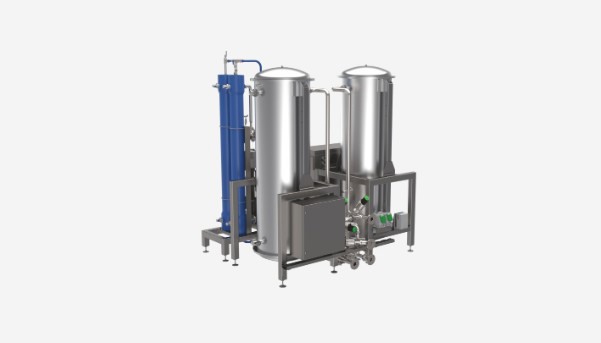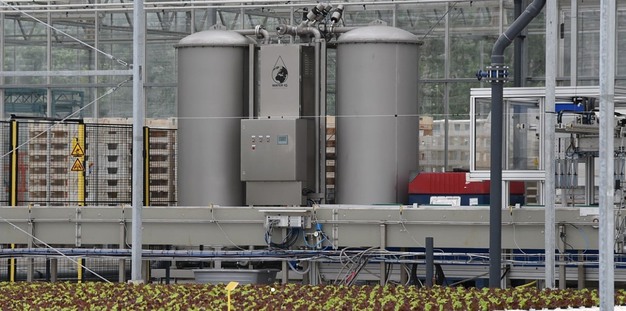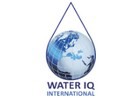With their newly developed Opticlear Diamond system, Dutch supplier Water IQ wants to supply better water to the plants. Water IQ is taking part in the PPO study OSIRES at WUR in Bleiswijk. That trial aims to determine the impact of water purification on plant growth and soil life.
The trial examines different water treatment techniques. Freddy Dekkers, director of Water IQ, says growers need to use less plant protection products if the water is kept healthy. "We have done our own research on stimulating naturally occurring PGPB bacteria in the malt production process for brewing beer. Fusarium control has also been studied in this context."

Opticlear Diamond. The company has thus been nominated for the Dutch award KVK Innovation Top 100.
Opticlear Diamond
Water IQ has been building knowledge on Fusarium. Freddy explains that a plant actually needs bacteria to protect itself from plant pathogens. "The Opticlear Diamond in particular is focused on monitoring water and adding the right nutrients at the right time. Our water treatment systems consist of a number of treatment steps. In the first step, pollutants are adsorbed in a packed column on ceramic carrier material."
"This adsorption step ensures the removal of organic pollutants and easily oxidisable substances. After adsorption, advanced oxidation will take place through the catalyst. This leads to a breakdown of contaminants, including viruses and microflora. By playing with that catalyst, you can influence the variety of water treatment. This enables you to break down crop protection agents in addition to disinfection. The system is flexible in terms of deployment because we can also use it to remove PFAS from the water."
Healthier plants
"With the water treatment system, healthier, more resilient plants can be realised. Growers can remove plant protection products from the water. In Belgium, the rules are even stricter for water discharge, as sodium and nitrogen must also be removed from the water there", he adds. "After 2027, you can't just discharge the water. We have developed a specific nitrogen filter. The bacteria sit on a dryer material. They are immobilised and therefore do not wash out. We pump the salty brine water past a biological bed reactor containing bacteria that can convert nitrogen into harmless nitrogen gas. This is done at high speed. We cannot influence the moisture content in the greenhouse but we can mean something to growers in terms of water quality."

Biological filter
An advantage of the system is that growers can easily shut down the system during crop changes. "It is a biological filter which you can turn on and off. This application is not yet operational in the Netherlands, but it is already being used at some horticultural companies in Belgium."
"The Opticlear Diamond disinfection technology has a big advantage in terms of energy consumption; per m3 only 1/20 or 1/25 compared to other systems. Furthermore, the system is made of stainless steel so you can use it for a long time. The system has been around since 2013. The ceramic granules in the system do not need to be replaced. Furthermore, you don't need to replace lights either, which is beneficial in terms of operational costs. The system can be equipped with an automatic cleaning system. The first versions were simple without automation, but growers increasingly need a fully automated system with automatic cleaning." Freddy therefore strongly recommends it.
"In the Netherlands, we are moving more and more towards emission-free cultivation and the social pressure on chemicals is increasing. We have to be prepared for that and we can only succeed if we use natural resilience."
"We are not using a cannon to kill a mosquito"
Selective treatment means the water is treated with precision. We first filter the water very clean and with one stroke we kill the viruses and microflora. This leaves the valuable substances created by the plant in the water. With a UV cleaning system, however, these valuable substances are broken down. The art of using the device consists of adjusting it correctly under specific growing conditions.
The need to clean water systems
According to Freddy, it is difficult if you don't take those options and have no discipline. "Compare it to a coffee machine that gives a notification when it needs to be cleaned. The machine has to be cleaned as well. The same goes for a water treatment plant that is full of mud. Cleaning is an under-reported aspect of the water system. You need to clean the whole water system in your silos and water tanks more often than once a year for a resilient system."
"In terms of purchase, the Opticlear Diamond is a bit more expensive, but the benefits are reflected in crop yield and operational costs. Water systems that are easy to clean are scarce in the horticulture sector. When building greenhouses, the most expensive options are not always chosen. The design of the greenhouse is important whether or not you get healthy plants. If you make sure you can clean your piping system automatically, you will get healthier plants."

Subsidies
In the past, there were energy-saving measures that allowed you to get subsidies on water treatment systems. Freddy emphasises that as a grower, you have to make a choice independent of subsidies. "If you build something the way it was built 10 years ago, you are not innovating," he says.
System dimensions
The water treatment systems take up no more space than a traditional UV system. Instead, they have a relatively smaller footprint. "For a large system, you quickly need a height of more than 3 metres. In some greenhouses, that's difficult because you're already up against the heating pipes. The system is about 4 metres wide, 2.5 metres deep and 3.30 metres high.
How long do these systems last?
"How long it lasts depends on how you use the system. If you just keep doing maintenance, you can run for more than 10 years with the system. But pumping and moving parts need more maintenance. Some parts like sensors and generators that ionise oxygen need to be replaced every five years. There are maintenance costs on pumps and these generators and sensors and you have to replace them every 5 or 7 years. By the way, these are not the most expensive parts."
It is not difficult for growers to use the system. The technician explains how to use the system in a meaningful way. The system is otherwise not complicated, as a pump pumps the water through two columns. There is a lot of demand for a solution to remove PFAS from water from other sectors. This is why Water IQ is currently less focused on the horticulture sector. "The cost of a water purification system depends on its capacity. The cost can be compared to a UV treatment plant."
For more information:
Water IQ Systems 
Hooge Zijde 15a
5626 DC Eindhoven
Tel: +31 (0) 40-303800
[email protected]
www.wateriq.nl
